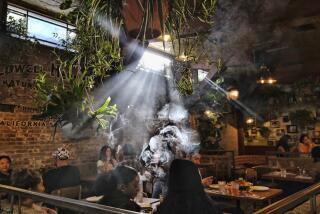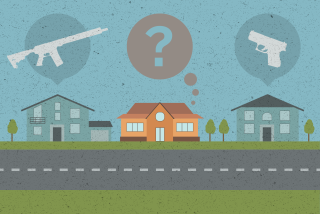The Great Divide : No Smoking Here, No Talking There and No Gun-Toting Over Yonder, Please
- Share via
DIVIDING RESTAURANTS into smoking and nonsmoking sections has become so de rigueur in Southern California that only the smallest holes-in-the-wall don’t do it.
Somehow, when the hostess asks, “Smoking or nonsmoking?” before leading my wife and me to a table, it makes me feel strangely virtuous to say “Nonsmoking.”
I feel as if I were at St. Peter’s Gate and had given the right answer for entrance. Like born-again Christians who have given up lives of blasphemy and sin, I think I am more self-righteous in my nonsmoking for having smoked for a quarter of a century.
Oddly, in the first several years after I quit, I didn’t mind the proximity of smokers. They could blow some my way, even at the table, and I wasn’t repulsed. There was even something nostalgically pleasant about the smell.
But once I had got it completely out of my system, tobacco smoke began to be repugnant and even nauseating. Today, when I go into a bar with unrestricted smoking, I hold my breath and walk out.
In settings where smokers once were the dominant species, they have become pariahs. At dinner parties, one sees smokers excusing themselves for a few minutes to smoke a cigarette on the patio. In many office buildings, they are permitted to smoke only in designated rooms. A nonsmoker passing one of those cells can smell the contraband smoke escaping from under the door. Through the glass slits in the doors, one can see the smokers sitting inside like prisoners smoking a final cigarette before their execution.
I haven’t been in England for many years, so I don’t know whether this therapeutic practice has taken hold there. However, the William Moyniers have sent me a clipping from the Wanganui (New Zealand) Chronicle that reports an astonishing reversal of custom at one of London’s “most distinguished gentlemen’s establishments,” the Savile Club.
For 111 years, it notes, members of the club had been required by tradition to maintain silence at breakfast. That hoary tradition was undone with a 12- word announcement: “The committee has agreed to a trial period of conversation at breakfast.”
This liberalization has provoked more dismay among members than smoking restrictions have in America. In fact, club secretary Peter Aldersley blamed the change on the American custom of doing business at breakfast. (If a no-talking rule had applied at the Beverly Hills Hotel’s Polo Lounge, half of the deals in show business would never have been cut.)
Older members of the club are appalled: “Good God,” said Lord Dacre of Glanton, better known as historian Hugh Trevor-Roper. “I shall resign at once. Conversation at breakfast is a terrible thought. They’re taking Sodalitas Convivium too far.”
“ Sodalitas Convivium ,” the newspaper explained, is the club motto, meaning “Friendship Through Companionship.” Lord Dacre blamed the change on “the unwholesome influence of the BBC and producers who come in with their briefcases.”
Another member, Sir Stephen Spender, who recently celebrated his 80th birthday at the club, said he doesn’t go much anymore. “I didn’t know they still served breakfast. Do you know at what time itis served?” Evidently the club’s tradition of silence was instituted in the 19th Century, when Queen Victoria was on the throne, to provide a speechless atmosphere in which thegentleman members could peruse their copies of the London Times first thing in the morning. Thus they could be apprised of the doings of Parliament and the conduct of Her Majesty’s troops and emissaries throughout the British Empire without the need to engage in distracting conversation. Today, of course, with no empire to rule, there is not so much point in reading the news.
Like the restriction on smoking, the new rule will not be absolute. Conversation will be allowed only at the terrace end of the dining room. Members may read their newspapers in silence at the Brooks Street end.
One wonders where this accommodation of public places to separate personal tastes will end. In America we are divided on gun control. Gun advocates, citing the Second Amendment, believe that every person should have the right to bear arms. The anti-gun crowd believes that it is insane for everyone to go about with weapons--concealed or unconcealed.
Perhaps the day will come when hostesses at the vestibules of restaurants will ask, “Armed or not?” One wonders whether the armed patrons will be seated in the smoking or nonsmoking section. I have no statistics on it, but I would guess that people who carry guns are more likely to smoke.
If indeed nonsmokers are seated in the unarmed section and vice versa, people who like to go about armed but don’t smoke are going to have a dilemma, and so are their opposites.
I’ll never smoke again, but I think I could give up conversation at breakfast, and I’d certainly rather not be armed.


